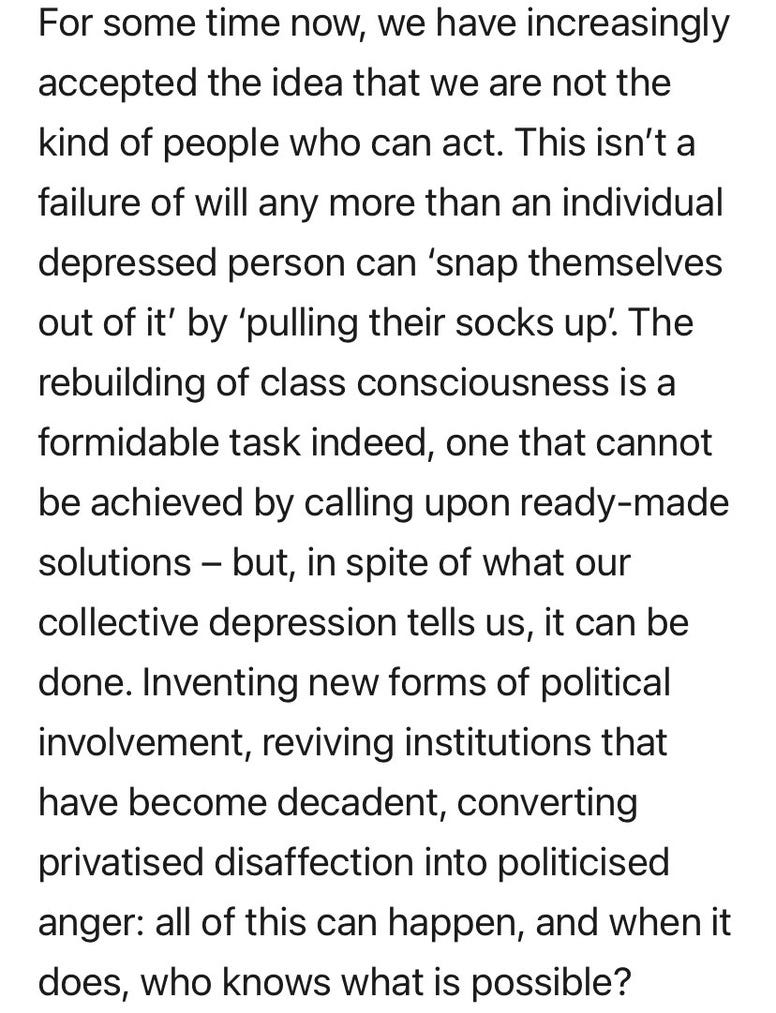The God Created From Human Vanity Sees No Difference Between Eagle And Sparrow
How these madmen give themselves away!
The thing about living in a hilly city where the sun hides for months is that on clear winter afternoons it seems like every quiet intersection has a person or two standing in it, facing west. Tuesday’s sunset was clear and cold and from my little balcony I watched a few people all take the same ritual pause during their walk to or from wherever. They turned their faces toward the brilliant colors and took, as though compelled, a deep breath.
I am trying to remember to look toward the sun, though some weeks it is harder than others. This week is one of those.
Have you ever read Dracula? It’s a tremendous book, certainly the most engaging epistolary novel I’ve ever read. It has endured with good reason. The vampire myth itself is fascinating to me, perhaps inevitably so—I read somewhere recently that vampire stories are the horrors of the working class, fitting as the metaphor of a rich aristocrat draining the blood of others to pervert the laws of nature and sustain himself is. (Zombies, meanwhile, are the ultimate horror of the bourgeoisie—the unwashed faceless masses gaining strength and devouring all in their path.)
Anyway. I think one of Dracula’s most fascinating characters is that of Renfield, the “lunatic” patient of Dr. Seward. Though not himself bitten. Renfield falls under the spell of the vampire, who communes with him through the bars of his cell; such is the sway Dracula holds over Renfield that the man begins constructing an intricate system of trapping insects and other small creatures to eat, each being enticed by the creatures lower than them. Renfield believes himself anointed, and has a healthy sense of superiority not just toward the creatures he devours (whose life force he believes will strengthen and prolong his own), but toward the doctor and other people outside his cell.
At one point Dr. Seward records in his journal the suppliant mutterings of his patient:
I am here to do your bidding, Master…You will reward me, for I shall be faithful. I have worshipped You long and afar off. Now that You are near, I await Your commands, and You will not pass me by, will You, dear Master, in Your distribution of good things?
I’ve been witness to a lot of depressing discourse about the stimulus check issue lately, is where all this is going. I think broad political statements about different eras and generations often miss the mark completely. But I do wonder if the celebrity age has resulted in a basic and widespread amnesia toward the fact that while we elect people to do things for us, they usually end up doing things to us.
The most successful recent bipartisan project of this country’s ruling class has been to turn the politically interested into their own bloc of Renfields. The Republican version has been made more and more appallingly obvious in the past few years: a literal death cult surrounding the now ex-President, whose supporters have built the religious image of an alpha billionaire everyman patriot out of a mincing, media-obsessed lout who, as Hunter S. Thompson once said of Nixon, was so crooked that he needed servants to help him screw his pants on every morning. But as I have spent most of my life in Democratic communities and social circles, this is the side of the problem I am more intimately familiar with. (To quote Thompson again: I know these people in my goddamn blood!)
Among Democrats, the condition is more diffuse, but no less serious. Rather than pinning their politics on one guy who they take pride in because he can get one over on their enemies, liberals have cast a wider net, selecting a whole lineup of avatars for themselves. I have written before about our damaging obsession with competence and credentials, even against the evidence of our own eyes and ears; that condition has gotten no less serious since the election of Joe Biden.
We do not, or at least should not, accept from anyone else in our lives that it’s what’s in their heart that counts, regardless of what they do. But we have talked ourselves into that as the truth about our elected and appointed rulers. Never mind the body count of the wars he carried out under false pretenses, [insert any living president] is ultimately a decent man who loves this country, that much is clear. Never mind that his wealth, built on the backs of untold thousands laboring for pennies a day, gives him more power than most national governments, [insert philanthropic billionaire] is trying to use his money to do some good, which is more than most people can say!
We absorb these seeming contradictions with ease. We want to be ruled by people whom we simultaneously believe to be us and to be our betters. And once you start seeing yourself in someone else, you have no choice but to claim their victories as yours and their failures as someone else’s.
There is nothing wrong with having heroes, even as we acknowledge that admiration tends to flatten and caricaturize its objects. I am not immune to it and I don’t mean to sound holier-than-thou. But the net effect of it in this case is that it creates an army of people who are not just willing to accept crumbs, but to scream at anyone who says they’re still hungry that actually, they have been presented with a feast. Like Renfield, they have come to believe that unquestioningly accepting the dictates of their betters is the most noble way to exist, all the while scorning as fools the people outside the bars of their cells who dare question their logic.
The stimulus check debate is a perfect example of what I’m talking about. Over the past few weeks I’ve watched otherwise progressive people twist themselves in knots to create post hoc justifications for a very simple truth: that the Biden White House has broken the core campaign promise that won both Senate seats in the Georgia special election for the Democrats. There is no universe in which “if you flip Georgia blue, $2,000 checks are going out the door” actually means “if you flip Georgia blue, $2,000 (spread across several) checks (one of which you got from the last president, who is Hitler and Voldemort all in one) are going out the door (to those of you who meet an arbitrary threshold based on your 2019 income, which has certainly stayed constant despite COVID-19).” None.
Yet it is now the smart, pragmatic position—again, among people who have no say and are forced to accept whatever they’re handed (or not handed) in a case like this!—to say that actually, if you didn’t do all that reading between the lines, you’re an idiot; what’s more, it’s good to set such a hard limit on income for these checks, because my god, can you imagine someone getting a check who didn’t need it?
Never mind that the $2,000 itself was a totally arbitrary amount set by the last president, and the Democrats had zero obligation to aim even that low in attempting to make people whole amidst a profound catastrophe. (It’s not like there weren’t better ideas; Rashida Tlaib and Pramila Jayapal were pushing to get every person in America $2,000 a month for the duration of the pandemic and $1,000 a month for a year afterward.) Never mind that the imposition of a $50,000 or even $75,000 limit to get the “full” $1,400 would mean that millions of people who got two checks under the last president (who, again, they have been told is Hitler and Voldemort but also worse) aren’t going to get jack (ha) under President Biden. A depressingly large bloc of Democratic voters have accepted the means-tested plan of their new president despite the fact that it is almost guaranteed to breed resentment and future political defeats based on how many people it will leave in the cold.
The folks driving those concerns about money going to the “wrong” people make up quite a roster, by the way.
Right-leaning Democratic senator Joe Manchin, for example, says he’s worried about money going to rich people who don’t need it. Steven Rattner, who helps gazillionaire Michael Bloomberg manage his money, made a similar case on MSNBC last week, insisting that payments must go to “people who actually need the money.” Like-minded arguments for further means-testing of the checks have elsewhere been made by neoliberal hedge fund veteran Larry Summers and the editorial boards of at least two media companies with billionaire owners.
Arguing against universal programs exists for a very simple reason: to prevent any meaningful expansion of the welfare state, which might cause a dent in the public’s willingness to accept the logic of capitalism. “The hypocrisy may be there, but its function is to serve as window dressing for something worse,” writes Luke Savage. “…it is more artifice than incoherence.” The Democrats could win in perpetuity by keeping it simple and taking credit. But that’s not what they exist to do.
In Dracula, Dr. Seward has Renfield under constant observation, which leads him to lament:
These infinitesimal distinctions between man and man are too paltry for an Omnipotent Being. How these madmen give themselves away! The real God taketh heed lest a sparrow fall; but the God created from human vanity sees no difference between an eagle and a sparrow. Oh, if men only knew!
I want you to know that breaking from all this madness is not beyond you. It is not out of your reach. Organizing for a better future—not just knowing all the right things—is difficult, tedious work, but it is the only work that has the power to change things for the better. Mark Fisher knew this:
Who knows, indeed? But I think it’s high time we found out, and stopped letting a handful of obscenely powerful people piss on our heads and tell us it’s raining.
Thanks, as always, for reading. I’ll talk to you next week.
-Chuck
PS - If you liked what you read here, why not subscribe and get this newsletter delivered to your inbox each week? It’s free and always will be.
PPS - RIP Karen Lewis, a true hero of the labor movement, who certainly knew how to organize people and fight.








